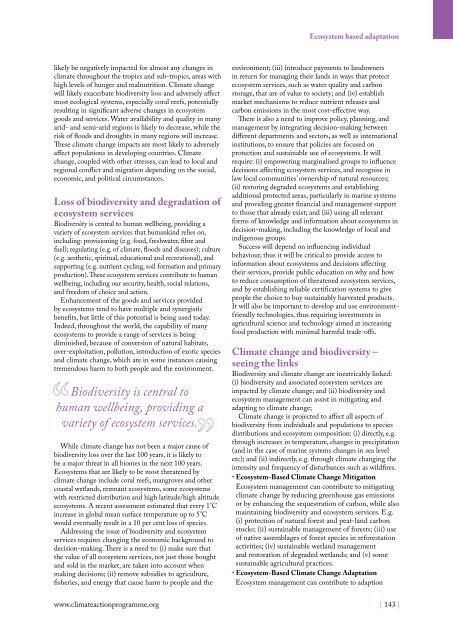Climate Action 2010-2011
You also want an ePaper? Increase the reach of your titles
YUMPU automatically turns print PDFs into web optimized ePapers that Google loves.
Ecosystem based adaptation<br />
likely be negatively impacted for almost any changes in<br />
climate throughout the tropics and sub-tropics, areas with<br />
high levels of hunger and malnutrition. <strong>Climate</strong> change<br />
will likely exacerbate biodiversity loss and adversely affect<br />
most ecological systems, especially coral reefs, potentially<br />
resulting in significant adverse changes in ecosystem<br />
goods and services. Water availability and quality in many<br />
arid- and semi-arid regions is likely to decrease, while the<br />
risk of floods and droughts in many regions will increase.<br />
These climate change impacts are most likely to adversely<br />
affect populations in developing countries. <strong>Climate</strong><br />
change, coupled with other stresses, can lead to local and<br />
regional conflict and migration depending on the social,<br />
economic, and political circumstances.<br />
Loss of biodiversity and degradation of<br />
ecosystem services<br />
Biodiversity is central to human wellbeing, providing a<br />
variety of ecosystem services that humankind relies on,<br />
including: provisioning (e.g. food, freshwater, fibre and<br />
fuel); regulating (e.g. of climate, floods and diseases); culture<br />
(e.g. aesthetic, spiritual, educational and recreational), and<br />
supporting (e.g. nutrient cycling, soil formation and primary<br />
production). These ecosystem services contribute to human<br />
wellbeing, including our security, health, social relations,<br />
and freedom of choice and action.<br />
Enhancement of the goods and services provided<br />
by ecosystems tend to have multiple and synergistic<br />
benefits, but little of this potential is being used today.<br />
Indeed, throughout the world, the capability of many<br />
ecosystems to provide a range of services is being<br />
diminished, because of conversion of natural habitats,<br />
over-exploitation, pollution, introduction of exotic species<br />
and climate change, which are in some instances causing<br />
tremendous harm to both people and the environment.<br />
Biodiversity is central to<br />
human wellbeing, providing a<br />
variety of ecosystem services.<br />
While climate change has not been a major cause of<br />
biodiversity loss over the last 100 years, it is likely to<br />
be a major threat in all biomes in the next 100 years.<br />
Ecosystems that are likely to be most threatened by<br />
climate change include coral reefs, mangroves and other<br />
coastal wetlands, remnant ecosystems, some ecosystems<br />
with restricted distribution and high latitude/high altitude<br />
ecosystems. A recent assessment estimated that every 1°C<br />
increase in global mean surface temperature up to 5°C<br />
would eventually result in a 10 per cent loss of species.<br />
Addressing the issue of biodiversity and ecosystem<br />
services requires changing the economic background to<br />
decision-making. There is a need to: (i) make sure that<br />
the value of all ecosystem services, not just those bought<br />
and sold in the market, are taken into account when<br />
making decisions; (ii) remove subsidies to agriculture,<br />
fisheries, and energy that cause harm to people and the<br />
environment; (iii) introduce payments to landowners<br />
in return for managing their lands in ways that protect<br />
ecosystem services, such as water quality and carbon<br />
storage, that are of value to society; and (iv) establish<br />
market mechanisms to reduce nutrient releases and<br />
carbon emissions in the most cost-effective way.<br />
There is also a need to improve policy, planning, and<br />
management by integrating decision-making between<br />
different departments and sectors, as well as international<br />
institutions, to ensure that policies are focused on<br />
protection and sustainable use of ecosystems. It will<br />
require: (i) empowering marginalised groups to influence<br />
decisions affecting ecosystem services, and recognise in<br />
law local communities’ ownership of natural resources;<br />
(ii) restoring degraded ecosystems and establishing<br />
additional protected areas, particularly in marine systems<br />
and providing greater financial and management support<br />
to those that already exist; and (iii) using all relevant<br />
forms of knowledge and information about ecosystems in<br />
decision-making, including the knowledge of local and<br />
indigenous groups.<br />
Success will depend on influencing individual<br />
behaviour, thus it will be critical to provide access to<br />
information about ecosystems and decisions affecting<br />
their services, provide public education on why and how<br />
to reduce consumption of threatened ecosystem services,<br />
and by establishing reliable certification systems to give<br />
people the choice to buy sustainably harvested products.<br />
It will also be important to develop and use environmentfriendly<br />
technologies, thus requiring investments in<br />
agricultural science and technology aimed at increasing<br />
food production with minimal harmful trade-offs.<br />
<strong>Climate</strong> change and biodiversity –<br />
seeing the links<br />
Biodiversity and climate change are inextricably linked:<br />
(i) biodiversity and associated ecosystem services are<br />
impacted by climate change; and (ii) biodiversity and<br />
ecosystem management can assist in mitigating and<br />
adapting to climate change;<br />
<strong>Climate</strong> change is projected to affect all aspects of<br />
biodiversity from individuals and populations to species<br />
distributions and ecosystem composition: (i) directly, e.g.<br />
through increases in temperature, changes in precipitation<br />
(and in the case of marine systems changes in sea level<br />
etc); and (ii) indirectly, e.g. through climate changing the<br />
intensity and frequency of disturbances such as wildfires.<br />
• Ecosystem-Based <strong>Climate</strong> Change Mitigation<br />
Ecosystem management can contribute to mitigating<br />
climate change by reducing greenhouse gas emissions<br />
or by enhancing the sequestration of carbon, while also<br />
maintaining biodiversity and ecosystem services. E.g.<br />
(i) protection of natural forest and peat-land carbon<br />
stocks; (ii) sustainable management of forests; (iii) use<br />
of native assemblages of forest species in reforestation<br />
activities; (iv) sustainable wetland management<br />
and restoration of degraded wetlands; and (v) some<br />
sustainable agricultural practices.<br />
• Ecosystem-Based <strong>Climate</strong> Change Adaptation<br />
Ecosystem management can contribute to adaption<br />
www.climateactionprogramme.org | 143 |












